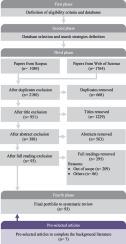How do the BRICS approach sustainable concerns? A systematic literature review
IF 4.7
2区 环境科学与生态学
Q2 ENVIRONMENTAL SCIENCES
引用次数: 0
Abstract
Brazil, Russia, India, China, and South Africa (BRICS) are recognized for their global impacts and representation across economic, social, and environmental aspects, as well as for comprising countries that strive to lead sustainable agendas in their respective regions. With a combined economy of $25.54 trillion and 42% of the world's population, these nations are responsible for significant sustainable impacts on a global scale, eliciting interest in the practices they undertake to promote sustainability. Thus, the aim of this manuscript is to identify the primary approaches employed in those countries to address sustainability. For this purpose, a systematic literature review was conducted using the ROSES reporting standards and PRISMA Statement methodology, encompassing a sample of 93 case studies from the BRICS countries spanning the period from 2010 to 2022. The findings reveal (i) a rise in publications from 2016 to 2021, notably in China and Brazil, with a focus on the agricultural and urban sectors, and (ii) five sustainability tools emerge prominently, each with more than two applications in existing studies: Life Cycle Assessment, Multicriteria Decision Making, Cleaner Production, Material Flow Cost Accounting, and Water Footprint Assessment. These findings underscore five primary policy implications: (a) the discrepancy between scientific efforts and data regarding the sustainability impacts of the countries; (b) the need for the use of more tools to enable regional sustainable development of the countries; (c) dissemination of effective practices; (d) trends in sustainability management focusing on water management and supply, environmental protection in urban areas, decision-making for sustainable development, and environmental and waste management, and (e) the need for better-developed public policies related to environmental impact that are not currently well-represented in scientific research, aiming to promote sustainability in various critical areas.

金砖五国如何处理可持续问题?系统性文献综述
巴西、俄罗斯、印度、中国和南非("金砖五国")因其在经济、社会和环境方面的全球影响力和代表性,以及在各自地区努力引领可持续发展议程的国家组成而得到认可。这些国家的经济总量达 25.54 万亿美元,人口占世界总人口的 42%,在全球范围内对可持续发展产生了重大影响,因此这些国家为促进可持续发展所采取的做法引起了人们的兴趣。因此,本手稿旨在确定这些国家为解决可持续发展问题所采用的主要方法。为此,我们采用 ROSES 报告标准和 PRISMA 声明方法,对金砖国家 2010 年至 2022 年期间的 93 个案例研究样本进行了系统的文献综述。研究结果表明:(i) 2016 年至 2021 年期间,以中国和巴西为重点的出版物数量有所增加,重点关注农业和城市部门;(ii) 五种可持续发展工具脱颖而出,每种工具在现有研究中都有两个以上的应用:生命周期评估、多标准决策、清洁生产、物料流成本核算和水足迹评估。这些发现强调了五个主要的政策影响(a) 有关各国可持续性影响的科学努力与数据之间的差异;(b) 需要使用更多的工具来促进各国的区域可持续发展;(c) 推广有效的做法;(d) 可持续性管理的趋势,重点是水资源管理和供应、城市地区的环境保护、可持续发展决策以及环境和废物管理;(e) 需要更好地制定与环境影响有关的公共政策,这些政策目前在科学研究中没有得到充分反映,目的是促进各个关键领域的可持续性。
本文章由计算机程序翻译,如有差异,请以英文原文为准。
求助全文
约1分钟内获得全文
求助全文
来源期刊

Environmental Development
Social Sciences-Geography, Planning and Development
CiteScore
8.40
自引率
1.90%
发文量
62
审稿时长
74 days
期刊介绍:
Environmental Development provides a future oriented, pro-active, authoritative source of information and learning for researchers, postgraduate students, policymakers, and managers, and bridges the gap between fundamental research and the application in management and policy practices. It stimulates the exchange and coupling of traditional scientific knowledge on the environment, with the experiential knowledge among decision makers and other stakeholders and also connects natural sciences and social and behavioral sciences. Environmental Development includes and promotes scientific work from the non-western world, and also strengthens the collaboration between the developed and developing world. Further it links environmental research to broader issues of economic and social-cultural developments, and is intended to shorten the delays between research and publication, while ensuring thorough peer review. Environmental Development also creates a forum for transnational communication, discussion and global action.
Environmental Development is open to a broad range of disciplines and authors. The journal welcomes, in particular, contributions from a younger generation of researchers, and papers expanding the frontiers of environmental sciences, pointing at new directions and innovative answers.
All submissions to Environmental Development are reviewed using the general criteria of quality, originality, precision, importance of topic and insights, clarity of exposition, which are in keeping with the journal''s aims and scope.
 求助内容:
求助内容: 应助结果提醒方式:
应助结果提醒方式:


